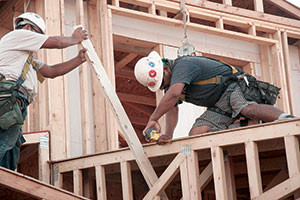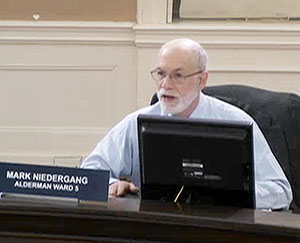By Josie Grove

The City Solicitor’s office is being urged to review the process whereby developers are granted permits for condominium conversions.
The Housing and Community Development Committee of the Board of Aldermen will be taking on the issue of condominium conversions, after Ward 5 Alderman Mark Niedergang attended the December 11 meeting of the Condominium Review Board and found the proceedings troubling.
“It was chaotic and poorly run,” Niedergang said at last Thursday’s Board of Aldermen meeting. “It appeared to me to be a conveyer belt for granting developers condo conversion permits.”
A Somerville resident tipped off the alderman to the problematic operation of the review board after struggling against eviction from his rented apartment so that it could be turned into condominiums.
“I’m the chair of the Housing and Community Development committee of the Board of Aldermen, so I had been meaning to go for a while,” said Niedergang. “The meeting was very poorly run, and the issues that [the resident] and his lawyers raised, the board and the staff of the board was not able to respond to them in a thoughtful and understandable way.”
Niedergang thinks that the Review board is not fulfilling its purpose. To protect tenants, Somerville passed a strong condominium conversion ordinance in 1980, and created the Condominium Review Board to enforce it. Among other provisions, the conversion ordinance asks that the condo review board consider the overall benefit to Somerville citizens, hardships of the tenants who will be removed, and the availability of rental units for low- and moderate-income people, the elderly, and handicapped people. Niedergang does not see this consideration from the condominium review board. At the December meeting, Niedergang saw, “The letters granting the permits were all already signed and sitting in a folder, and as the developers made their cases, the board just handed them permits,” said Niedergang.

Ward 5 Alderman Mark Niedergang expressed his concern over what he felt was a “conveyor belt” process in granting condominium conversion permits.
Denise Taylor, the city of Somerville’s Director of Communications, explained that the review process cannot stop a condo conversion, but only ensures that tenants receive the protections outlined in the condo conversion ordinance. “What to an outsider may look like simple rubber stamping of applications for condo conversions, because most go forward, is actually a detailed process that attempts to safeguard tenants by ensuring that when conversions do happen, tenants are at least given proper warning, an opportunity to purchase the units themselves, and moving cost support.”
Developers have found a way to circumvent the waiting period and convert to condominiums more quickly. “Before selling to developers,” explains Niedergang, “landlords are told to get the tenants out, so that the developer can have an empty building and an easier path to a condo. Two months later, they’re in the condo review board, bang, they get their certificate, and it’s done.”
“I’m concerned that they might not be enforcing the law as strongly as possible because of interpretations that the law is not valid anymore,” said Niedergang, referring to the 1995 state law that outlawed rent control in Massachusetts. “There’s a lot of gray area about what the law actually says, and a lot of that has been invalidated by the state legislation.”
“The rent control law basically struck down anything in condo conversions that could affect rent. That can be interpreted broadly or narrowly,” explains Niedergang. “Our ordinance talked a lot about maintaining rental properties and maintaining the number of rental properties in the city, and that was deemed to be illegal. The law can now only be used to protect renters, not properties from being converted.” That is, the law cannot be applied to vacant properties.
Niedergang thinks that apparent contradictions between the city law and the state law have given rise to an overly permissive environment for condo conversions. “The board, and the chair especially, seemed to think that they should be granting these permits,” says Niedergang, who would like to see a more critical review board.
Niedergang wants the law to further protect tenants, which he sees as key to keeping Somerville diverse. “Low and moderate income people are being driven out of the city, and they’re being replaced by wealthier, much wealthier people,” he said. The condo conversion ordinance will be reviewed by the City Solicitor’s office, and will be discussed in the Housing and Community Development committee of the Board of Aldermen.















It seems disingenuous to think that restricting condo conversions is helping low income folks… let’s be honest, if a family is able to spend 2k on an apartment that roughly equates to the mortgage payment on a 400k loan. If the city wanted to help long term renters and help build long lasting community it would be better off focusing on helping middle income people buy homes.
Matt, could you be any more out of touch? The problem is, many renters can’t afford to spend $2,000 on an apartment. Believe it or not there are still some more affordable apartments out there. And just because you can afford the mortgage payment doesn’t mean you can get the loan. There are so many factors that come into play…..the down payment, credit history, length of employment, salary, other debt, etc.
Renting and owning both come with their own costs/benefits, risks/rewards. The aldermen are trying to give renters the benefits of ownership without any of the risks.
Also high cost of housing is caused by the board of alderman, who regularly fight density (see last year’s torpedoing of zoning overhaul, for example). They try to create distractions by rattling their swords in effectual ways.
Matt is absolutely right.
“Cut it out” guys! 😛
Complete non-issue. Niedergang has been ineffectively groping around for something to grandstand on since he took office, and it looks like this is his latest windmill to tilt at.
Like Taylor said, the review process primarily addresses tenant’s rights and has nothing really to do with granting or denying permits. And that process is carried out properly.
Epic fail.
I’m with Jim G. Niedergang has done nothing but push rent control without actually mentioning the words. Ask him or Lafuente how much money they make with their rental units and if they are willing to make them affordable or add them to the affordable housing stock. 2015 came and went but we need change at city hall.